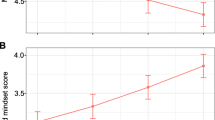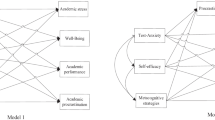Abstract
Middle Eastern (Omani) and Western (U.S.) students’ beliefs about knowledge and knowing in the sciences were compared on four dimensions of personal epistemology proposed by Hofer and Pintrich (Review of Educational Research (1997), 67, 88–140). As predicted, given their experiences with comparatively traditional political and religious institutions, Omani more so than U.S. college students were more likely to accept scientific authorities as the basis of scientific truth. Furthermore, Omani men were more accepting of authorities than were Omani women, but there was no gender difference among U.S. students. Omani more than U.S. students also believed that knowledge in the sciences was simpler and more certain, which is consistent with comparisons between U.S. and Asian students (e.g., Qian & Pan, 2002, A comparision of epistemological beliefs and learning from science text between American and Chinese high school students. In B. K. Hofer & P. R. Pintrich (Eds.), Personal epistomology: The psychology of beliefs about knowledge and knowing (pp. 365–385), Mahwah, NJ: Erlbaum). Students in the two countries did not differ, however, in whether their beliefs were based on personal opinions versus systematic evidence. Suggestions for further research included directly assessing experiences with, and attitudes toward, authorities in academic and other areas of students’ lives.
Similar content being viewed by others

References
P.A. Alexander F.J. Douchy (1995) ArticleTitleConceptions of knowledge and beliefs: a comparison across varying cultural and educational communities American Educational Research Journal 32 413–442
B. Altemeyer B. Hunsberger (1992) ArticleTitleAuthoritarianism, religious fundamentalism, quest, and prejudice International Journal for the Psychology of Religion 2 113–133
Al-Salhi, A.S. (2001). Epistemological beliefs among Saudi college students. Unpublished doctoral dissertation, University of Northern Colorado.
M.B. Baxter-Magolda (1992) Knowing and reasoning in college: Gender-related patterns in students’ intellectual development Jossey Bass San Francisco
M.B. Baxter-Magolda (2004) ArticleTitleEvolution of a constructivist conceptualization of epistemological reflection Educational Psychologist 39 IssueID1 31–42
M.F. Belenky B.M. Clinchy M.R. Goldberger J.M. Tarule (1986) Women’s ways of knowing Basic Books New York
B.M. Clinchy (2002) Revisiting women’s ways of knowing B.K. Hofer P. R. Pintrich (Eds) Personal epistemology: The psychology of beliefs about knowledge and knowing. Erlbaum Mahwah, NJ 63–87
K. Chan R.G. Elliott (2002) ArticleTitleExploratory study of Hong Kong teacher education students’ epistemological beliefs: Cultural perspectives and implications on beliefs research Contemporary Educational Psychology 27 392–414 Occurrence Handle10.1006/ceps.2001.1102
N.T. Feather (1993) ArticleTitleDevaluing achievement within a culture: Measuring the cultural cringe Australian Journal of Psychology 45 IssueID3 182–188
N.T. Feather I.R. McKee (1993) ArticleTitleGlobal self-esteem and attitudes toward the high achiever for Australian and Japanese students Social Psychology Quarterly 56 IssueID1 65–76
B.K. Hofer (2000) ArticleTitleDimensionality and disciplinary differences in personal epistemology Contemporary Educational Psychology 25 IssueID4 378–405 Occurrence Handle10.1006/ceps.1999.1026
B.K. Hofer (2002) Personal epistemology as a psychological and educational construct: An introduction P.R. Pintrich (Eds) Personal epistemology: The psychology of beliefs about knowledge and knowing. Erlbaum Mahwah, NJ 3–13
B.K. Hofer (2004) ArticleTitleEpistemological understanding as a metacognitive process: Thinking aloud during online searching Educational Psychologist 39 43–55
B.K. Hofer P.R. Pintrich (1997) ArticleTitleThe development of epistemological theories: Beliefs about knowledge and knowing and their relation to learning Review of Educational Research 67 88–140
B.K. Hofer P.R. Pintrich (Eds) (2002) Personal epistemology: The psychology of beliefs about knowledge and knowing Erlbaum Mahwah, NJ
Jacobson, M.J., Jehng, J., & Maouri, C. (1997, April). The cultural and domain specificity of epistemological beliefs: A cross-cultural comparison of Taiwanese and American university students. Paper presented at the annual meeting of the American Educational Research Association, New York.
L. Mason M. Castiglioni (2000) ArticleTitleStudents’ beliefs about the nature and acquisition of knowledge An application of the Epistemic beliefs Inventory. Ricerche di Psicologia 24 165–188
T.M. McDevitt E.P. Sheehan J.B. Cooney T. Smith B. Walker (1994) ArticleTitleConceptions of listening, learning processes, and epistemologies held by American, Irish, and Australian university students Learning & Individual Differences 6 IssueID2 231–256
R.E. Nisbett (2003) The geography of thought The Free Press New York
Oman Ministry of Higher Education (2002). Book of Statistics 2001–2002, vol. 4. Muscat, Oman Ministry of Higher Education.
W.G. Perry (1970) Forms of intellectual and ethical development in the college years Nolt, Rinehart and Winston New York
G. Qian J. Pan (2002) A comparison of epistemological beliefs and learning from science text between American and Chinese high school students B. K. Hofer P. R. Pintrich (Eds) Personal epistemology: The psychology of beliefs about knowledge and knowing Erlbaum Mahwah, NJ 365–385
S. Rassekh (2004) Education as a motor for development: Recent education reforms in Oman with particular reference to the status of women and girls International Bureau of Education Switzerland
A. Raviv D. Bar-Tal A. Raviv (2003) ArticleTitleTeachers’ epistemic authority: Perceptions of students and teachers Social Psychology of Education 5 IssueID1 17–42
M. Schommer (1990) ArticleTitleEffects of beliefs about the nature of knowledge on comprehension Journal of Educational Psychology 82 498–504 Occurrence Handle10.1037/0022-0663.82.3.498
M. Schommer-Aikins (2002) An evolving theoretical framework for an epistemological belief system B.K. Hofer P.R. Pintrich (Eds) Personal epistemology: The psychology of beliefs about knowledge and knowing. Erlbaum Mahwah NJ 103–118
M. Schommer-Aikins (2004) ArticleTitleExplaining the epistemological belief system: Introducing the embedded systemic model and coordinated research approach Educational Psychologist 39 IssueID1 19–29 Occurrence Handle10.1207/s15326985ep3901_3
Strommer, D.W. (2001, May 29). Advising across cultures. The Mentor: An Academic Advising Journal, 3(2). Retrieved February 15, 2005 from http://www.psu.edu/dus/mentor.
H.C. Triandis (1995) Individualism and collectivism Westview Boulder, CO
F. Vijver Particlevan de K. Leung (1997) Method and data analysis for cross-cultural research Sage Thousand Oaks, CA
S. Volet S. Järvelä (2001) Motivation in learning contexts: Theoretical advances and methodological implications Pargamon Amsterdam
I. Youn (1997) The culture specificity of epistemological beliefs about learning University of Missouri Columbia
I. Youn (2000) ArticleTitleThe culture specificity of epistemological beliefs about learning Asian Journal of Social Psychology 3 87–105 Occurrence Handle10.1111/1467-839X.00056
Author information
Authors and Affiliations
Corresponding author
Rights and permissions
About this article
Cite this article
Karabenick, S.A., Moosa, S. Culture and Personal Epistemology: U.S. and Middle Eastern Students’ beliefs about Scientific Knowledge and Knowing. Soc Psychol Educ 8, 375–393 (2005). https://doi.org/10.1007/s11218-005-1826-3
Issue Date:
DOI: https://doi.org/10.1007/s11218-005-1826-3



